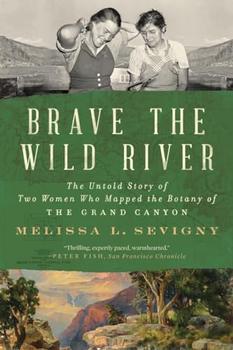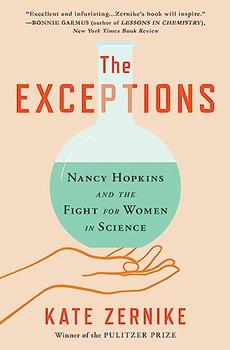Summary | Excerpt | Reviews | Beyond the book | Read-Alikes | Genres & Themes | Author Bio

The Untold Story of Two Women Who Mapped the Botany of the Grand Canyon
by Melissa L. SevignyIn 1938, accompanied by a crew of four boatmen, botanists Elzada Clover and Lois Jotter embarked on a 43-day journey along the Colorado River. Famed for its perilous rapids and rock-strewn waters, no woman had ever successfully navigated the particular 600-mile stretch of river undertaken by the team. Clover and Jotter's shared aim was to prove themselves equal to their male counterparts, both as scientists and as shipmates, and to create a comprehensive catalogue of the varied plant species growing within the Grand Canyon – becoming the first people to do so in Western science.
The two women at the heart of the expedition were more than qualified to take on the task at hand. Clover had a Ph.D. in botany, while Jotter was a specialist in plant genetics working on her doctorate. Despite these credentials, they struggled to secure funding for the project and faced sexism from the press, who saw them as headline-grabbing novelties, long before they even set off on their campaign.
Author Melissa L. Sevigny draws on coverage of the expedition and the letters and journals written by the crew at the time to tell Clover and Jotter's story. She adeptly captures the determination, tenacity and professionalism that would see the women through their mission. Never dry, the account reads like the tale of adventure that it is, reflecting the danger and exhilaration of the journey without resorting to melodrama. Aside from a later chapter that feels like a rushed summary of the women's lives post-expedition, it's well paced to maintain interest. The writing paints vivid pictures of the lush, sensory-rich scenes encountered by the team, as evidenced by the book's opening lines:
"The night was full of noises. The driftwood campfire snapped and spluttered, casting a circle of light on the river-rippled sand. Beyond, darkness pressed. Somewhere in the undergrowth a small creature rustled and scratched. The willows fringing the sandbar made a susurration as water rushed around their roots. Over, under, through it all, ran the Colorado River."
In addition to the misogyny Clover and Jotter had to overcome, Sevigny goes to great lengths to emphasize the imperialism and racism that underpinned much of the work being carried out at the time – something the two botanists were aware of and ashamed about. Native populations had been living among and documenting the land's flora and fauna for generations, but many of their accounts and insights were ignored or destroyed outright so white men could take the glory of "discovering" species in their place. Similarly, as understanding grew about the importance of conservation, Indigenous people were often pushed out of their homelands by the formation of National Parks, fabricating the idea of land that was "untouched" by man.
With this added context, it becomes apparent that Clover and Jotter's expedition took place at a time of slowly shifting attitudes. Yes, they proved themselves capable and won the respect of their male crewmates, but they were also still expected to carry out much of the domestic work onboard the boats – such as preparing food and taking care of the crew's laundry. Not to mention that in 1932, just six years prior to Clover and Jotter's impressive expedition, Roy Chapman Andrews, president of the men-only Explorers Club, had publicly declared women "too sensitive" to handle exploration – a mindset that undoubtedly still lingered among many of their peers by the time they set sail. Thus, Clover and Jotter wrote of their shared fear that their scientific efforts would be lost to history, their role in the mission tokenized and careers diminished due to their gender. Sevigny's account strives to ensure this won't be the case. She gives due reverence to her subjects' exciting, pioneering lives without losing focus on the enduring relevance of their work as a benchmark in botanical research.
![]() This review was originally published in The BookBrowse Review in June 2023, and has been updated for the
June 2024 edition.
Click here to go to this issue.
This review was originally published in The BookBrowse Review in June 2023, and has been updated for the
June 2024 edition.
Click here to go to this issue.

If you liked Brave the Wild River, try these:

by River Selby
Published 2025
The fierce debut memoir of a female firefighter, Hotshot navigates the personal and environmental dangers of wildland firefighting.

by Kate Zernike
Published 2024
From the Pulitzer Prize–winning journalist who broke the story, the inspiring account of the sixteen female scientists who forced MIT to publicly admit it had been discriminating against its female faculty for years—sparking a nationwide reckoning with the pervasive sexism in science.
Your guide toexceptional books
BookBrowse seeks out and recommends the best in contemporary fiction and nonfiction—books that not only engage and entertain but also deepen our understanding of ourselves and the world around us.